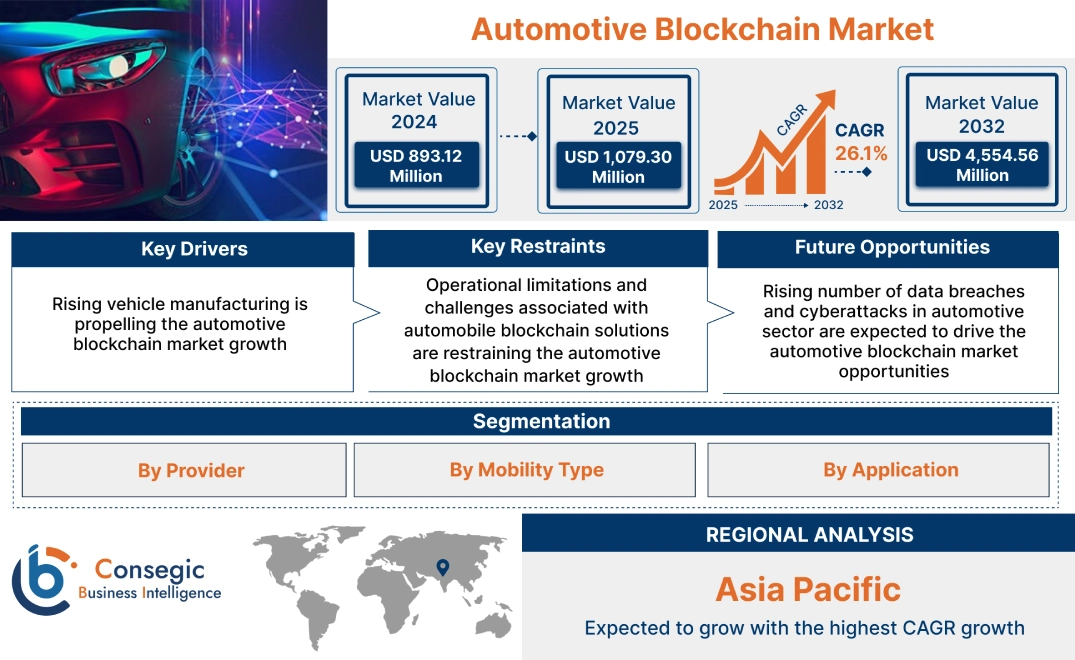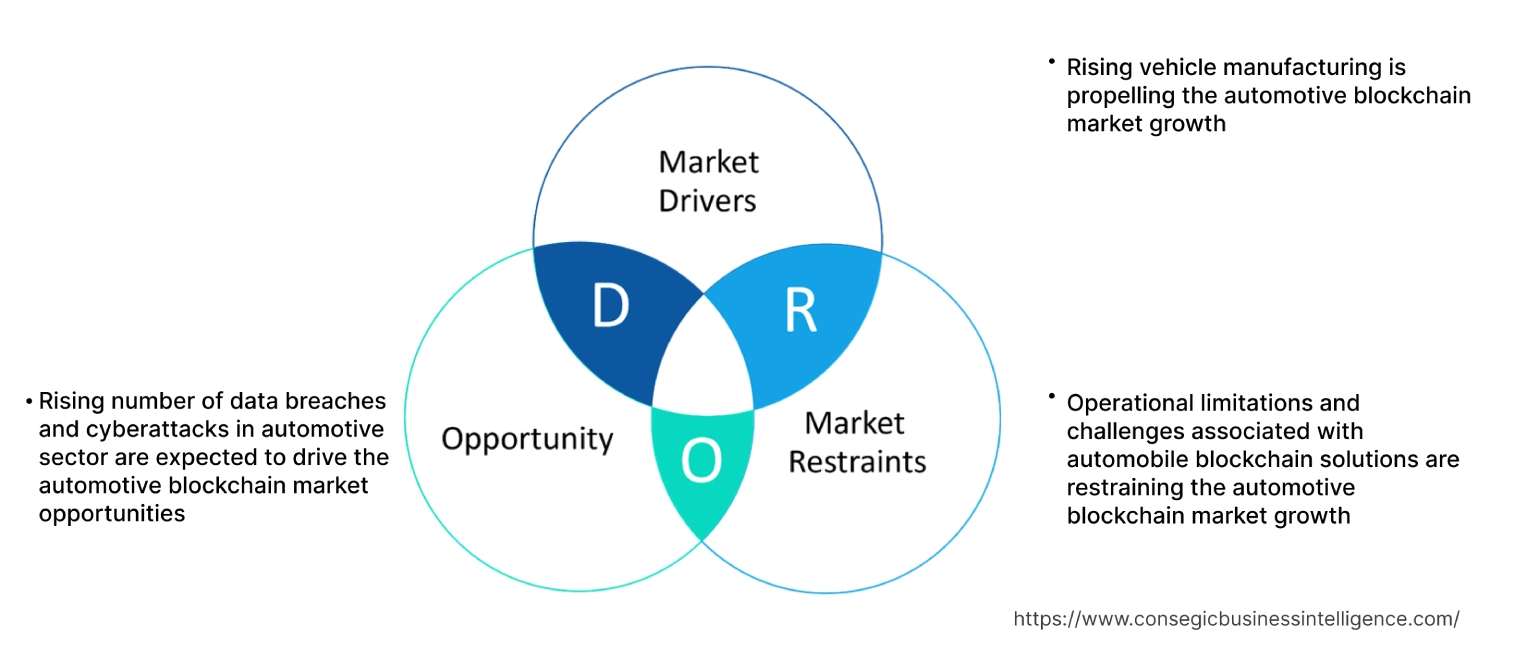- Summary
- Table Of Content
- Methodology
Automotive Blockchain Market Size:
Automotive Blockchain Market size is estimated to reach over USD 4,554.56 Million by 2032 from a value of USD 893.12 Million in 2024 and is projected to grow by USD 1,079.30 Million in 2025, growing at a CAGR of 26.1% from 2025 to 2032.
Automotive Blockchain Market Scope & Overview:
In automotive sector, blockchain technology can be utilized for various applications such as supply chain management, vehicle history tracking, ownership records, smart contracts, mobility solutions, and others. Automotive blockchain also facilitates monetary transactions, agreements, and records to enable vehicle owners to monetize transportation services and experiences. Moreover, automotive blockchain solutions offer several benefits including increased transparency, improved traceability, enhanced security, faster transactions, and enhanced customer experience among others.
Key Drivers:
Rising vehicle manufacturing is propelling the automotive blockchain market growth
Automotive block chain solutions are primarily used by automotive original equipment manufacturers (OEMs) during vehicle manufacturing related applications. Blockchain can be used for tracking and managing the flow of materials and components from suppliers to manufacturers. Moreover, automobile blockchain solutions also enable secure and transparent data sharing among various participants in the supply chain, in turn improving collaboration with suppliers. Additionally, the use of blockchain enables OEMS to track every parts used in a vehicle throughout its lifecycle, ranging from production to the point of sale. As a result, the rising vehicle manufacturing is driving the market.
- For instance, according to the International Organization of Motor Vehicle Manufacturers, the total automotive production in North America reached up to 16,166,628 units in 2023, representing an increase of 9% from 14,795,419 units in 2022.
Hence, according to the analysis, the rising vehicle manufacturing is increasing the need for blockchain solutions for applications involving supply chain management, quality control and compliance, traceability of parts, and others. The above factors are proliferating the automotive blockchain market size.
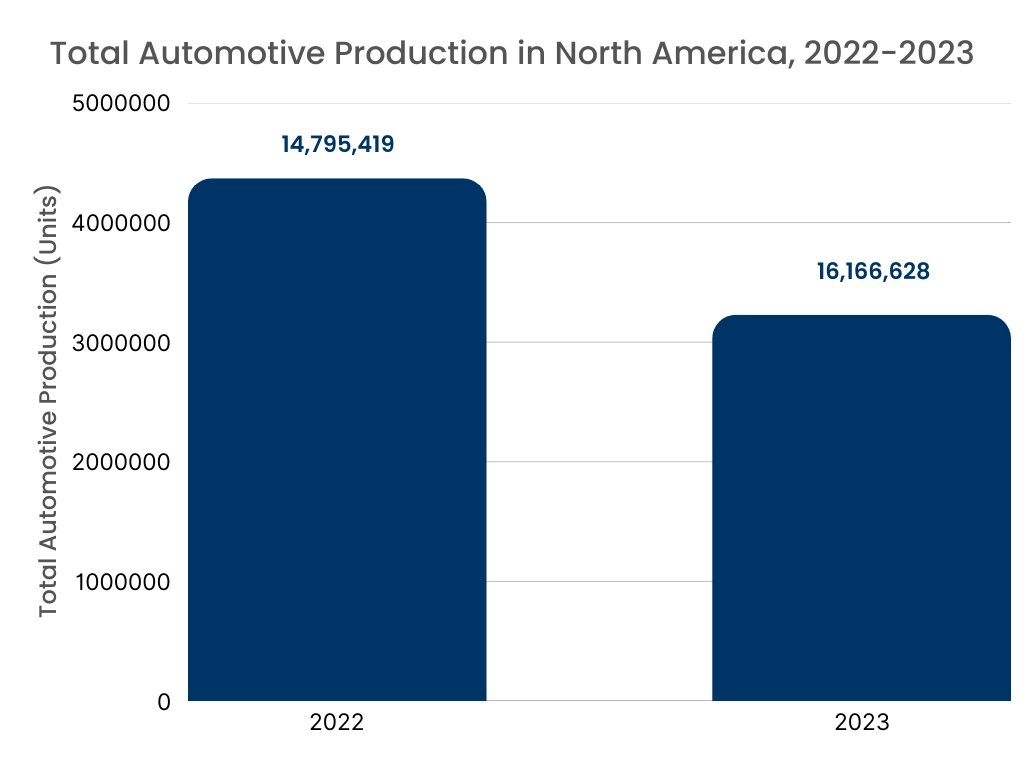
Key Restraints:
Operational limitations and challenges associated with automobile blockchain solutions are restraining the automotive blockchain market growth
The implementation of automotive blockchain solution is often associated with certain operational limitations and challenges, which are among the key factors restraining the market. For instance, the legal framework around blockchain technology is still evolving, leading to uncertain landscape for automobile blockchain solutions. Moreover, blockchain technology is prone to issues related to scalability. Blockchain, particularly public ones, often becomes slow and inefficient as the number of transactions increases. This latency may hamper real-time applications in the automotive sector.
Additionally, interoperability is another challenge related to automobile blockchain solutions. The automotive industry comprise of several stakeholders, including manufacturers, dealers, suppliers, and regulators, each possibly utilizing different blockchain platforms. As a result, ensuring seamless communication and data exchange among these different stakeholders may be quite challenging. Further, the integration of blockchain technology into existing automotive IT infrastructure typically require substantial investment and expertise. Thus, the aforementioned factors are hindering the automotive blockchain market expansion.
Future Opportunities :
Rising number of data breaches and cyberattacks in automotive sector are expected to drive the automotive blockchain market opportunities
The automotive sector is transforming significantly as vehicles are increasingly connected to everything in order to support innovations such as advanced driver assistance systems (ADAS), autonomous driving, shared mobility, electric vehicles (EVs), and others. As the ecosystem becomes increasingly connected, the advent of connected vehicles leads to increment in potential attack points while exposing new vulnerabilities that hackers may exploit for threatening the vehicle safety, car data integrity, and users' privacy. Blockchain technology provides a reliable medium for collecting data and delivering it in a secure and immutable state. Moreover, automotive OEMs can utilize blockchain technology as a platform for improving overall vehicle cybersecurity, enabling secure micropayments, validating software specifications, enhancing identity management, and improving data verification. As a result, the rising number of data breaches and blockchain attacks in automotive sector are increasing the need for advanced automobile blockchain solutions, which is expected to drive the market.
- For instance, in 2024, Volkswagen Group witnessed a significant data breach, which exposed sensitive information of approximately 800,000 EV owners across its several brands such as Volkswagen, Seat, Audi, and Skoda. The data breach occurred due to a misconfigured Amazon cloud storage system, which was managed by Volkswagen’s software subsidiary, Cariad, leading to online accessibility of personal and location data for several months.
Hence, as per the analysis, the rising number of data breaches and cyberattacks in automotive sector are increasing the need for advanced security solutions, which is projected to boost the automotive blockchain market opportunities during the forecast period.
Automotive Blockchain Market Segmental Analysis :
By Provider:
Based on provider, the market is segmented into middleware, infrastructure and protocols, and application and solution.
Trends in the provider:
- Increasing trend in adoption of solutions from application & solution providers for facilitating supply chain management, smart contract implementations, and mobility solutions among others.
- Rising utilization of solutions from infrastructure & protocol providers for developing protocols, platforms, and infrastructure for supporting numerous applications within the automotive ecosystem.
The application and solution segment accounted for the largest revenue share in the overall automotive blockchain market share in 2024, and it is anticipated to register significant CAGR growth during the forecast period.
- Application and solution providers primarily focus on developing particular applications or platforms that leverage blockchain technology for addressing specific challenges or needs within the automotive sector.
- Application and solution providers often provide solutions including tools for supply chain management, digital identity management, vehicle tracking, and smart contracts among others.
- Moreover, application and solution providers can provide secure data exchange and storage by deploying blockchain technology while reducing vulnerability to data breaches and fraud.
- For instance, in April 2021, Groupe Renault, Faurecia, Simoldes, Knauf Industries, and Coşkunöz, in association with IBM, signed a partnership contract for the deployment of XCEED (eXtended Compliance End-to-End Distributed), which is a blockchain-based shared solution developed for tracing the compliance of several parts assembled within a vehicle in real time.
- Therefore, the above factors are further driving the automotive blockchain market trends.
By Mobility Type:
Based on mobility type, the market is segmented into personal mobility, shared mobility, and commercial mobility.
Trends in the mobility type:
- Factors including the rising disposable income, growing popularity of luxury cars, rising sales of passenger cars, and progressions in autonomous driving systems are key trends propelling the personal mobility segment.
- Factors including rising adoption of ridesharing services for facilitating cost-effective travel and reduced traffic congestion, along with increasing need for economical modes of transportation and logistics are primary trends for driving the growth of shared mobility and commercial mobility segment
Personal mobility segment accounted for the largest revenue share of 57.03% in the total automotive blockchain market share in 2024.
- Personal mobility refers to a mode of transportation which individuals utilize for personal travel. This primarily includes private car ownership and other similar services.
- Moreover, blockchain solutions enables users to track each vehicle’s ownership history, maintenance records, and accident history based on the vehicle’s distinctive digital identity on the blockchain.
- Additionally, blockchain solutions can also facilitate smart contracts, which are capable of automating payments, insurance claims, and other agreements based on well-defined conditions. This helps in streamlining operations and ensuring timely payments.
- For instance, according to the International Organization of Motor Vehicle Manufacturers, the total sales of passenger cars worldwide reached up to 65,272,367 units in 2023, representing an increase of 11.3% from 58,644,601 units in 2022.
- Therefore, increasing sales of passenger cars and growing personal mobility solutions are driving the automotive blockchain market trends.
Commercial mobility segment is anticipated to register substantial CAGR growth during the forecast period.
- Commercial mobility refers to transportation modes used for business purposes, including logistics, freight transport, fleets, and public transport systems.
- Moreover, automobile blockchain solutions are primarily used in commercial mobility sector for applications involving commercial vehicle fleet management, logistics and supply chain management, smart contracts, and others.
- For instance, according to the International Organization of Motor Vehicle Manufacturers, the overall global sales of commercial vehicles reached 27,452,301 units in 2023, witnessing an incline of 13.3% from 24,226,493 units in 2022.
- Thus, rising commercial vehicle sales and increasing adoption of automobile blockchain solutions in commercial mobility sector are projected to expand the automotive blockchain market size during the forecast period.
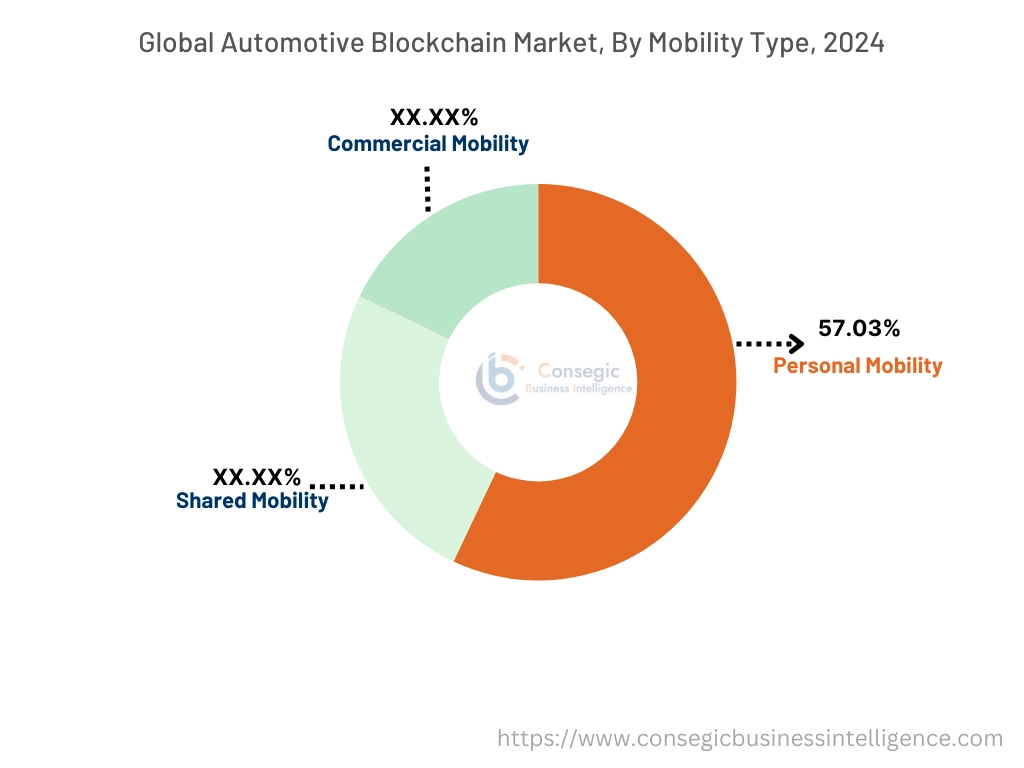
By Application:
Based on application, the market is segmented into smart contracts, supply chain, financing, mobility solutions, and others.
Trends in the application:
- Increasing adoption of blockchain solutions in automotive supply chain management applications for facilitating increased transparency and accountability, improved coordination, and enhanced operational efficiency.
- Rising utilization of blockchain technology in mobility solutions to facilitate the integration of multiple transport services such as public transport, bike-sharing, private ride-hailing, and others into a single accessible platform, in turn extending users' mobility options.
The supply chain segment accounted for the largest revenue share in the overall market in 2024.
- Supply chain management in automotive sector involves the planning and execution of processes that produce and deliver vehicles and parts efficiently, ranging from raw material sourcing to final vehicle assembly and distribution.
- The use of blockchain in automotive supply chain management enables each component in the supply chain, ranging from raw materials to finished vehicles, to be tracked in real time.
- Moreover, the utilization of blockchain also improves collaboration among manufacturers, suppliers, and buyers by providing a shared platform for data exchange. Additionally, participants can access real-time data regarding production schedules, inventory levels, and demand forecasts, which leads to improved coordination and reduced inventory holding costs.
- For instance, in April 2020, Marelli introduced the utilization of blockchain technology for enhancing automotive supply chain management, creating a distributed peer-to-peer network to connect suppliers and automakers’ plants across the world. The blockchain technology improves traceability of automobile components and raw materials, which enables more efficient and reliable transactions and operations, while offering substantial benefits to all the players in the value chain.
- According to the automotive blockchain market analysis, rising utilization of blockchain solutions in automotive supply chain management applications is driving the market.
Mobility solutions segment is anticipated to register substantial CAGR growth during the forecast period.
- Mobility solutions includes services that facilitate transportation and movement, including car-sharing, ride-sharing, public transportation, and logistics solutions.
- Moreover, blockchain technology is often used in mobility solutions for applications involving ride-sharing and car-sharing platforms, fleet management, data management, and others.
- Additionally, the use of blockchain can enable decentralized platforms that remove intermediaries from ride and car-sharing models, which fosters peer-to-peer interactions and payments.
- For instance, MOBI, the Mobility Open Blockchain Initiative, recently announced its formation to explore blockchain for utilization in a new digital mobility ecosystem for making transportation more affordable, safer, and widely accessible. MOBI and partners, including Bosch, BMW, Ford, Groupe Renault, General Motors, Aioi Nissay Dowa Insurance Services USA, ZF, and others aim to develop an ecosystem where consumers and businesses can have sovereignty and security over their driving data, manage car-share and ride-share transactions, and store vehicle identity and usage information.
- Thus, the above factors are projected to increase the adoption of automobile blockchain solutions, thereby, driving the market during the forecast period.
Regional Analysis:
The regions covered are North America, Europe, Asia Pacific, the Middle East and Africa, and Latin America.
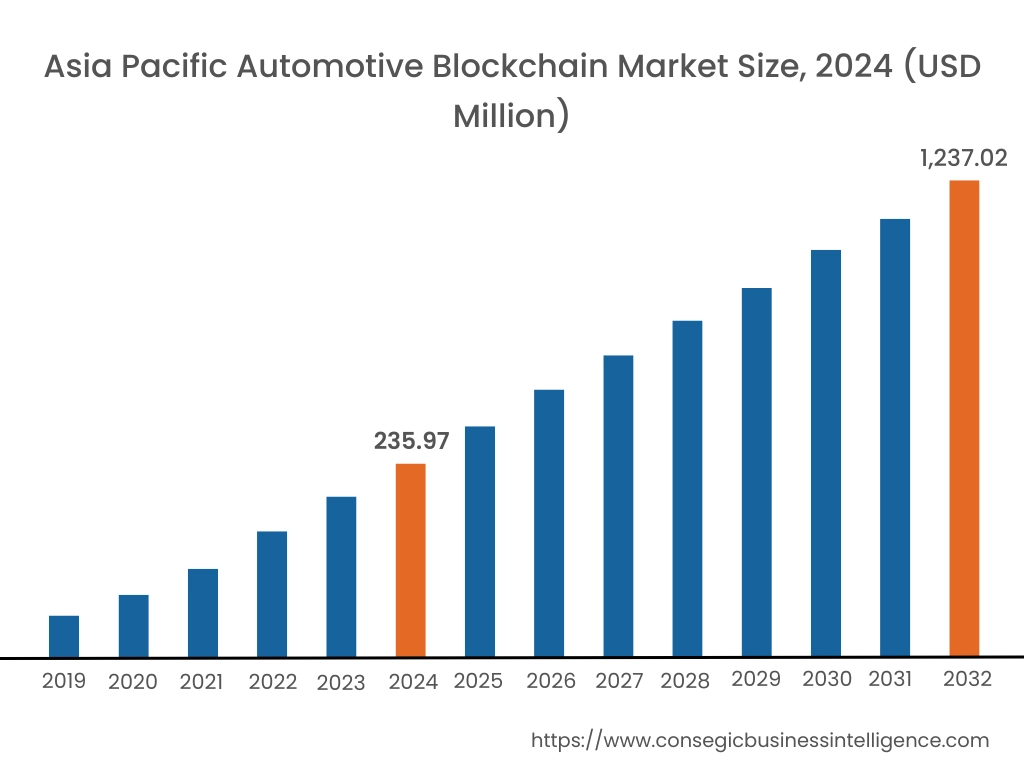
Asia Pacific region was valued at USD 235.97 Million in 2024. Moreover, it is projected to grow by USD 285.82 Million in 2025 and reach over USD 1,237.02 Million by 2032. Out of this, China accounted for the maximum revenue share of 35.97%. As per the automotive blockchain market analysis, the adoption of automobile blockchain solutions in the Asia-Pacific region is primarily driven by increasing government investments in automotive industry, rising automobile production, and growing number of connected vehicles. Moreover, the rising vehicle manufacturing and increasing utilization of blockchain technology for automotive supply chain management applications are further accelerating the automotive blockchain market expansion.
- For instance, according to the Society of Indian Automobile Manufacturers (SIAM), the total production of commercial vehicles in India reached 10,66,429 units during FY 2023-24, witnessing an increase from 10,35,626 units in FY 2022-23. The aforementioned factors are propelling the market demand in the Asia-Pacific region.
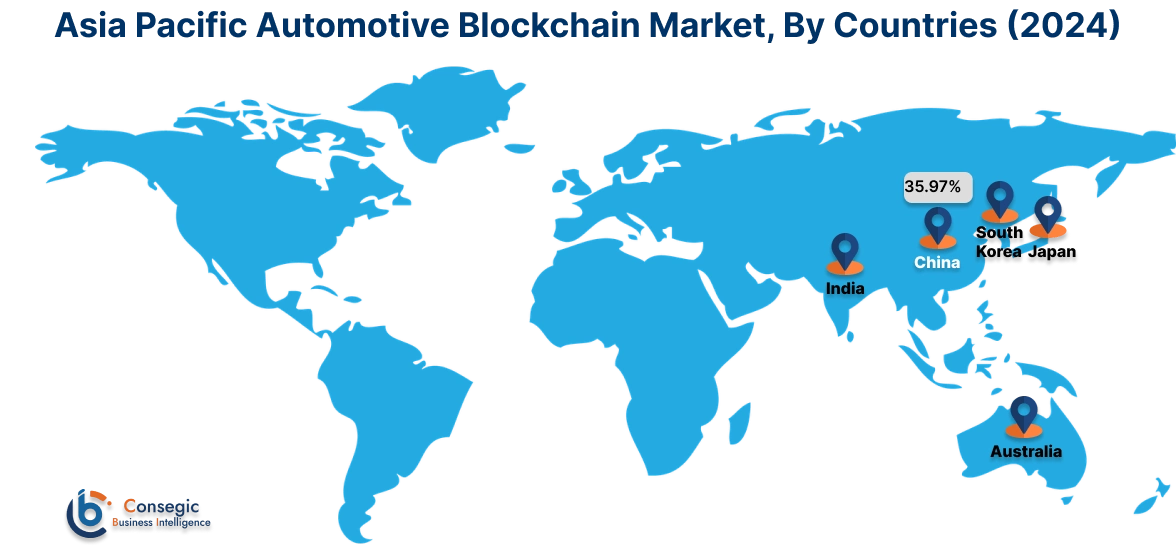
North America is estimated to reach over USD 1,509.84 Million by 2032 from a value of USD 297.72 Million in 2024 and is projected to grow by USD 359.62 Million in 2025. In North America, the growth of automotive blockchain industry is driven by prevalence of several automobile manufacturers and increasing automotive production in the region. Similarly, rising advancements related to autonomous vehicles and growing developments related to connected vehicles are contributing to the automotive blockchain market demand.
- For instance, according to the International Organization of Motor Vehicle Manufacturers, the total automotive production in the United States reached up to 10,611,555 units in 2023, representing an increase of 6% as compared to 2022. The above factors are projected to drive the market in North America during the forecast period.
Additionally, the regional analysis depicts that increasing vehicle production, advent of electro mobility, growing shared mobility ecosystem, and rising need for advanced automotive security solutions are driving the automotive blockchain market demand in Europe. Further, as per the market analysis, the market demand in Latin America, Middle East, and African regions is expected to grow at a substantial rate due to several factors such as growing automotive sector, increasing investments in electric vehicle manufacturing, and rising need for automobile blockchain solutions for improved automotive security and supply chain management among others.
Top Key Players and Market Share Insights:
The global automotive blockchain market is highly competitive with major players providing solutions to the national and international markets. Key players are adopting several strategies in research and development (R&D), product innovation, and end-user launches to hold a strong position in the automotive blockchain market. Key players in the automotive blockchain industry include-
- BigchainDB GmbH (Germany)
- CONSENSYS (U.S.)
- IBM Corporation (U.S.)
- Accenture (Ireland)
- GEM (U.S.)
- HCL Technologies Limited (India)
- Microsoft (U.S.)
- NXM Labs Inc. (U.S.)
- ShiftMobility Inc. (U.S.)
- Tech Mahindra Limited (India)
Recent Industry Developments :
Partnerships & Collaborations:
- In April 2021, Groupe Renault, Faurecia, Simoldes, Knauf Industries, and Coşkunöz, in association with IBM, signed a partnership contract for the deployment of XCEED (eXtended Compliance End-to-End Distributed), which is a blockchain-based shared solution developed for tracing the compliance of several parts assembled within a vehicle in real time.
Automotive Blockchain Market Report Insights :
| Report Attributes | Report Details |
| Study Timeline | 2019-2032 |
| Market Size in 2032 | USD 4,554.56 Million |
| CAGR (2025-2032) | 26.1% |
| By Provider |
|
| By Mobility Type |
|
| By Application |
|
| By Region |
|
| Key Players |
|
| North America | U.S. Canada Mexico |
| Europe | U.K. Germany France Spain Italy Russia Benelux Rest of Europe |
| APAC | China South Korea Japan India Australia ASEAN Rest of Asia-Pacific |
| Middle East and Africa | GCC Turkey South Africa Rest of MEA |
| LATAM | Brazil Argentina Chile Rest of LATAM |
| Report Coverage |
|
Key Questions Answered in the Report
How big is the automotive blockchain market? +
The automotive blockchain market was valued at USD 893.12 Million in 2024 and is projected to grow to USD 4,554.56 Million by 2032.
Which is the fastest-growing region in the automotive blockchain market? +
Asia-Pacific is the region experiencing the most rapid growth in the automotive blockchain market.
What specific segmentation details are covered in the automotive blockchain report? +
The automotive blockchain report includes specific segmentation details for provider, mobility type, application, and region.
Who are the major players in the automotive blockchain market? +
The key participants in the automotive blockchain market are BigchainDB GmbH (Germany), CONSENSYS (U.S.), IBM Corporation (U.S.), Accenture (Ireland), GEM (U.S.), HCL Technologies Limited (India), Microsoft (U.S.), NXM Labs Inc. (U.S.), ShiftMobility Inc. (U.S.), Tech Mahindra Limited (India), and others.
